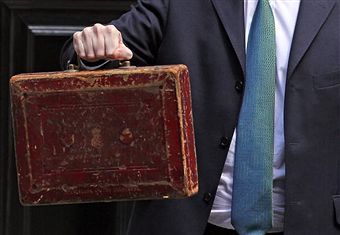 Today’s Emergency Budget announced the most ambitious fiscal consolidation
programme in decades. It sets out a framework returning the government broadly to a state of fiscal solvency by 2014. To do this, George Osborne announced a deficit reduction programme
amounting to just over £100 billion in real terms – entirely in line with our recommendations. The ratio of spending cuts to tax rises – 74:26 is largely in line with the
international best practice model (which we also endorsed) of 80:20.
Today’s Emergency Budget announced the most ambitious fiscal consolidation
programme in decades. It sets out a framework returning the government broadly to a state of fiscal solvency by 2014. To do this, George Osborne announced a deficit reduction programme
amounting to just over £100 billion in real terms – entirely in line with our recommendations. The ratio of spending cuts to tax rises – 74:26 is largely in line with the
international best practice model (which we also endorsed) of 80:20.
Instead of government living well beyond its means for the next four years, we estimate that the Chancellor’s plans will reduce the structural deficit – in other words, the additional
borrowing which will not disappear when the economy recovers – to just over 1 percent of GDP – far smaller than the 2.8 percent implied by the previous government’s plans.
It will also reduce spending to about 40 percent of GDP by 2015 – around the level which prevailed in the 1990s – eliminating the huge hike in spending since 2005.
Of course, this is really only the start of the process; it will reassure financial markets and gets the broad brush maths done. The real debate now will be how these figures are translated
into specific reductions in departmental budgets – which we will find out in the Comprehensive Spending Review on 20th October. Ringfencing NHS and international aid spending, as
Osborne admitted, implies real-terms cuts in all other departments of 25 percent – a figure unprecedented in the UK since at least the 1920s.
The Chancellor stressed that some departments would carry less of the burden. Nevertheless, this implies dramatically low levels of spending in historic terms for departments that gained
little during Labour’s spending booms. Even a 20% cut in the defence budget would mean David Cameron’s government in 2014 would be spending no more on defence than Clement
Attlee’s government in 1950. It would also raise the NHS’ share of the spending pie dramatically – from 28 percent today to 37 percent in 2015 – the largest in its
history. Some have questioned whether this enormous shift in the structure of government spending is possible – or fair.
There are elements of this Budget that few will object to (the £13.5 billion saved in debt interest payments, for example) and others which are more controversial (we are concerned about the
impact of a VAT rise, which our analysis has shown would be more damaging to growth than an income tax rise). But, whatever the political consequences, today’s budget will demonstrate
to the world that Britain is serious about getting it finances under control. It makes a ‘Greek’ style scenario much less likely – and not a moment too soon.
Ed Holmes is a Research Fellow in Policy Exchange’s Economics Unit.
Ed Holmes
A credible start






Comments